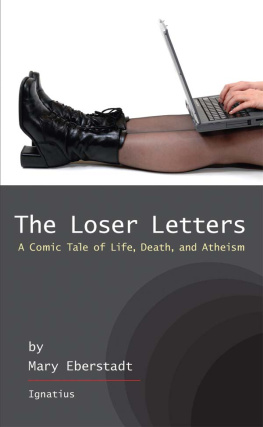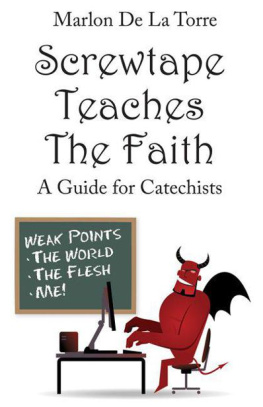Paved with Good Intentions
A Demons Roadmap to Your Soul
C. S. Lewis
Edited by Patricia S. Klein

I willingly believe that the damned are, in one sense, successful, rebels to the end; that the doors of hell are locked on the inside. I do not mean that the ghosts may not wish to come out of hell, in the vague fashion wherein an envious man wishes to be happy: but they certainly do not will even the first preliminary stages of that self-abandonment through which alone the soul can reach any good. They enjoy forever the horrible freedom they have demanded, and are therefore self-enslaved: just as the blessed, forever submitting to obedience, become through all eternity more and more free.
C. S. Lewis, The Problem of Pain
Contents
It seemed an innocuous discovery, an obscure notebook with highlighted passages surrounded by scribbles in a crabbed hand. On closer inspection its purposes become clear, its intentions less innocent. It belonged once to a fiend named Wormwood and represents his training under his demon uncle Screwtape. The notebook contains bits of correspondence, annotations, remarks, and the occasional cross-reference. It is, in short, a demons personal field book, full of instructions, techniques, practices, and observations. A working manual of temptation. A handbook of corruption and destruction. A window into a world of distortion and deception.
There is a current bit of wisdom circulating in our culture of addiction: How do you know when an addict is lying? Answer: His lips are moving. Of course, one could find any number of substitutes for addict: politician, teenager, corporate executive, cable news host, lawyer. We howl in protest, He lied! with the same outrage of a New York tourist complaining about a rigged game of three-card monte: He cheated! And of course we arent really surprised. We know that the game is rigged and we know that were being lied tounless weve wrapped ourselves too comfortably in denial (another lovely word from the world of addiction!).
So it is apparently with the Devil: he is a liar. If his lips are moving, he is lying. And as becomes apparent in this fiendish little souvenir, he is happy to employ any strategy to separate humans from the Enemy (God), be they direct lies, diversions, half-truths: deceptions all. His goal is to numb, to corrupt, to erode virtue into viceany means necessary to move us slowly, inexorably away from the Creator and toward the created.
The question becomes, Do we believe he is lying to us? Do we believe our game is rigged? Or are we so far gone that we cannot recognize these deceptions and think were just fine, thank you very much. Before you answer (before you lie to yourself!), permit yourself a moment or two to review this demons notes. Then make up your own mind.
Patricia S. Klein
FIELD NOTE
T he only thing that matters is the extent to which you separate the man from the Enemy. It does not matter how small the sins are provided that their cumulative effect is to edge the man away from the Light and out into the Nothing. Murder is no better than cards if cards can do the trick. Indeed the safest road to Hell is the gradual onethe gentle slope, soft underfoot, without sudden turnings, without milestones, without signposts.
Re: The Church as a Tool
Use the Church itself as a weapon against the Humans Christian faith
One of our great allies at present is the Church itself. Do not misunderstand me. I do not mean the Church as we see her spread out through all time and space and rooted in eternity, terrible as an army with banners. That, I confess, is a spectacle which makes our boldest tempters uneasy. But fortunately it is quite invisible to these humans. All your patient sees is the half-finished, sham Gothic erection on the new building estate. When he goes inside, he sees the local grocer with rather an oily expression on his face bustling up to offer him one shiny little book containing a liturgy which neither of them understands, and one shabby little book containing corrupt texts of a number of religious lyrics, mostly bad, and in very small print. When he gets to his pew and looks round him he sees just that selection of his neighbours whom he has hitherto avoided. You want to lean pretty heavily on those neighbours. Make his mind flit to and fro between an expression like the body of Christ and the actual faces in the next pew. It matters very little, of course, what kind of people that next pew really contains. You may know one of them to be a great warrior on the Enemys side. No matter. Your patient, thanks to Our Father Below, is a fool. Provided that any of those neighbours sing out of tune, or have boots that squeak, or double chins, or odd clothes, the patient will quite easily believe that their religion must therefore be somehow ridiculous. At his present stage, you see, he has an idea of Christians in his mind which he supposes to be spiritual but which, in fact, is largely pictorial. His mind is full of togas and sandals and armour and bare legs and the mere fact that the other people in church wear modern clothes is a realthough of course an unconsciousdifficulty to him. Never let it come to the surface; never let him ask what he expected them to look like. Keep everything hazy in his mind now, and you will have all eternity wherein to amuse yourself by producing in him the peculiar kind of clarity which Hell affords.
The Strategy of Disappointment
Work hard, then, on the disappointment or anticlimax which is certainly coming to the patient during his first few weeks as a churchman. The Enemy allows this disappointment to occur on the threshold of every human endeavour. It occurs when the boy who has been enchanted in the nursery by Stories from the Odyssey buckles down to really learning Greek. It occurs when lovers have got married and begin the real task of learning to live together. In every department of life it marks the transition from dreaming aspiration to laborious doing. The Enemy takes this risk because He has a curious fantasy of making all these disgusting little human vermin into what He calls His free lovers and servantssons is the word He uses, with His inveterate love of degrading the whole spiritual world by unnatural liaisons with the two-legged animals. Desiring their freedom, He therefore refuses to carry them, by their mere affections and habits, to any of the goals which He sets before them: He leaves them to do it on their own. And there lies our opportunity. But also, remember, there lies our danger. If once they get through this initial dryness successfully, they become much less dependent on emotion and therefore much harder to tempt.
The Strategy of Diversion
Surely you know that if a man cant be cured of churchgoing, the next best thing is to send him all over the neighbourhood looking for the church that suits him until he becomes a taster or connoisseur of churches.
The reasons are obvious. In the first place the parochial organisation should always be attacked, because, being a unity of place and not of likings, it brings people of different classes and psychology together in the kind of unity the Enemy desires. The congregational principle, on the other hand, makes each church into a kind of club, and finally, if all goes well, into a coterie or faction. In the second place, the search for a suitable church makes the man a critic where the Enemy wants him to be a pupil. What He wants of the layman in church is an attitude which may, indeed, be critical in the sense of rejecting what is false or unhelpful, but which is wholly uncritical in the sense that it does not appraisedoes not waste time in thinking about what it rejects, but lays itself open in uncommenting, humble receptivity to any nourishment that is going. This attitude, especially during sermons, creates the condition (most hostile to our whole policy) in which platitudes can become really audible to a human soul. There is hardly any sermon, or any book, which may not be dangerous to us if it is received in this temper. So pray bestir yourself and send this fool the round of the neighbouring churches as soon as possible.



















